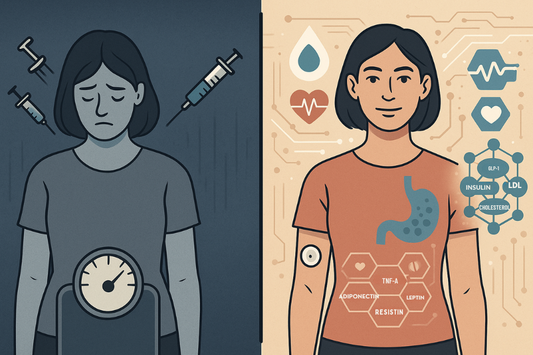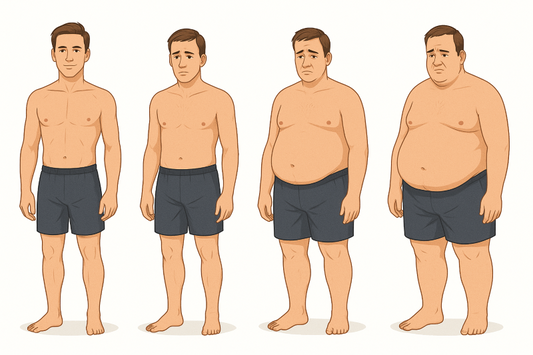An introduction to chronic stress
No conversation on longevity and healthy ageing is complete unless we talk about stress. Stress is something that affects us all, for good and for bad, so it is important to understand the different types of stress and the effects they have on our bodies.
It’s worth remembering that the stress response is a healthy and important response. A constantly activated stress response, however, or “chronic stress”, is not good news. Chronic stress not only diminishes the joy of day-to-day life, but also reduces both healthspan and lifespan.
If we get into a cycle of chronic stress, it can often be difficult to see the way out. Most people know that sleep, exercise, mindfulness, and a good diet are key to managing stress. The problem is that when we are in a state of chronic stress it can be really challenging to do these things. That’s when natural and safe supplements can be helpful. The right supplements can help to rebuild the mental resilience that will help you build the longer-term lifestyle changes that are required to help you live better and live longer.
The impact of stress on our long-term health
High stress means high adrenaline and cortisol, the stress hormones. In the medium term it drives a state of anxiousness, early morning waking, and poor sleep. This is then followed by the burnout or flatline state, which can bring depression, an inability to get out of bed in the morning, and a generally flat emotional response. Without the normal fluctuation in our mood and emotional responses, the colour and joy goes out of life.
Chronic stress is debilitating in the medium term, but it can cause severe damage in the long term. Symptoms include anxiety and depression, increased belly fat, muscle wasting (especially in the arms and legs), thinning hair, and poor skin. It can also cause digestive problems, poor sleep, headaches, memory problems, and heart disease. On top of all of this, it will depress the immune system. One study showed that the immune cells of highly stressed individuals are aged by an extra 10 years (1).
In another study, stress was shown to increase the risk of Alzheimer’s, the most common type of dementia. A study from Australia by David Groth looked at the interaction of Alzheimer’s with stress. High cortisol causes poor regulation of glucose in the brain, which is a recognised cause of Alzheimer’s.
What can we do to prevent or alleviate stress?
Exercise, sleep, mindfulness / meditation, and a healthy diet all impact how we deal with stress.
Sometimes when we have become chronically stressed we get into a vicious cycle. High cortisol means poor sleep, poor sleep affects concentration and our ability to function. This increases anxiety, thereby feeding the stress response.
Before reaching for medications there are a number of supplements that can have a significant effect. Although less potent, supplements are natural and safe. In addition, they do not have the side effect profile or dependency issues that many medications can cause.
How do supplements help manage stress?
There are five main ways that we can hack the stress response using supplements:
- Support the production of inhibitory neurotransmitters, like glutamate and GABA.
- Support the deactivation of excitatory neurotransmitters, like adrenaline.
- Calm the emotional area of the brain, the amygdala.
- Calm the HQ of the brain, the hypothalamus.
- Reduce inflammation in the body and brain.
Six supplements to manage stress
1. Magnesium glycinate
Actually, this is two supplements combined. Magnesium and glycine have separate ways in which they improve stress. Both help to reduce anxiety, to improve sleep quality as well as promoting a more regular sleep pattern. They are a safe, natural alternative to sleep medication.
How does magnesium glycinate improve stress?
Firstly, glycine on its own works directly as an inhibitory neurotransmitter, along with GABA, on the areas of the brain linked to stress. It helps to calm the brain and boost the relaxation hormone, serotonin. This has a significant impact on the amygdala, the emotional centre in the brain that is a key player in activating the stress response. It is best taken at night, helps the brain switch off and improves sleep (2).
As a bit of a bonus, let’s also mention L-theanine. L-Theanine (200mg) taken before bed has a similar effect to glycine. It does not work as a sedative, but as an anxiolytic – it reduces anxiety and therefore cortisol. There is no evidence of addiction or tolerance to either and, unlike sleep medication, it promotes entering into deep sleep. Glycine along with L-theanine are regarded as natural and safe sleep aids (3).
Secondly, magnesium has long been recognised as a natural calming mineral that can help to ease anxiety and promote relaxation. Magnesium again reduces overactivity in the emotional centre (amygdala) and also the brain HQ (hypothalamus). For a more detailed look at the wider benefits of magnesium, please refer to our recent article.
Together, these two nutrients can help to reduce stress levels and improve overall wellbeing. Magnesium glycinate is a form of magnesium that is highly bioavailable, meaning that it is easily absorbed by the body. It is best taken at night.
Supplement tips – how to choose the right magnesium supplement?
- When looking for a magnesium supplement look for the chelated forms, meaning ones that are attached to another molecule like citrate or glycine.
- Be aware that high doses of magnesium citrate can initially act as a laxative.
- Avoid magnesium oxide: it is not absorbed into the body in an available form and is basically a laxative.
- For athletes we see good results with magnesium glycinate. Not only do athletes require higher levels of magnesium, intense exercise increases cortisol and both magnesium and glycine work effectively to reduce this. Recommended dose is 1000 mg magnesium glycinate at night.
- Take with L theanine (200mg) at night- Sleep stack
An introduction to adaptogens
2. Rhodiola rosea
Rhodiola is my personal favourite and I add this to my protocol when I have a particularly stressful period. Rhodiola rosea is a herb native to Europe and Asia and has been used for centuries to help alleviate stress and anxiety. It promotes a sensation of clear, calm focus.
It has been extensively studied and used by the Russian military in the 1960’s to improve performance in the battlefield as well as being used for Kosmonauts and Olympic Athletes.
Since then, a lot of research has proven its effects on boosting exercise performance and balancing the effects of cortisol, the stress hormone (4)(5)(6)(7).
If you are undergoing intense exercise training it is another supplement that may be worth adding to your protocol.
In terms of wider health benefits, rhodiola:
- Supports memory and concentration.
- Protects the brain from age-related decline.
- Supports mood and mental health.
How does rhodiola reduce stress?
Rhodiola rosea is thought to be effective because it helps to increase the availability of neurotransmitters like serotonin and dopamine. These neurotransmitters are important for regulating mood and for providing a sense of calm and wellbeing. Rhodiola is also thought to help improve cognitive function and protect the brain from stress-related damage.
Multiple studies have been performed on the 140 compounds present in rhodiola on isolated organs, cells, and humans. They have shown to have neuroprotective, cardioprotective, anti-fatigue, antidepressive, anxiolytic, nootropic, lifespan increasing effects and can stimulate the central nervous system. A number of clinical trials demonstrate an anti-fatigue effect that increases mental performance (particularly the ability to concentrate in healthy subjects), and reduces burnout in patients suffering from chronic fatigue.
It has cortisol-reducing properties and interacts with defensive mechanisms in the body. Some people even report increased libido and sexual performance. This may be linked to the fact that libido is inhibited by cortisol and the potent effect of rhodiola helps to reverse this.
Rhodiola is also important for healthy ageing and longevity. It has been shown to regulate AMPK, an enzyme within our cells that controls the use of energy in the body. It has longevity actions by inhibiting the mTOR pathway (8).
Supplement tips
-
Like many herbs the exact makeup of rhodiola can vary a lot. The two important things to look out for are:
- Rosavins at least 3%
- Salidroside at least 1%
- Our recommended dose is 200-400mg
- Like many adaptogens rhodiola is best taken “pulsed”. This means using for periods for 6-12 weeks and then having a rest period of at least 4 weeks.
3. Ashwagandha
Ashwagandha is a herb that has been used in Ayurvedic medicine for centuries. It is known for its ability to help the body cope with stress and anxiety (9).
There are a number of studies that have looked at the effects of ashwagandha on stress and anxiety. One study found that it was effective in reducing stress levels in medical students during exam time. Another study found that ashwagandha was effective in reducing symptoms of anxiety in people with generalised anxiety disorder.
How does ashwagandha reduce stress?
Multiple studies show that ashwagandha suppresses the release of cortisol from the adrenal glands, thereby blunting the stress response. It does this by boosting the effect of GABA receptors and serotonin, which inhibit the stress response. It also inhibits the enzyme acetylcholinesterase, meaning levels of acetylcholine increase. This is the neurotransmitter linked to motivation and helps us feel calm and focused.
Supplement tips
- Dose varies however studies show that the best effects start at around 400mg.
- There are a number of ashwagandha brands to choose from. One that has shown to be consistent in quality is the KSM-66 Ashwagandha.
4. B vitamins
Some of the B vitamins have a powerful effect on the stress response. A 2019 systematic review showed that people with deficient levels of B vitamins had an improvement in stress and mood when they supplemented with B vitamins. In healthy individuals there was no benefit in taking further B vitamins (10).
How do B vitamins reduce stress?
B vitamins help to produce calming neurotransmitters like dopamine, serotonin, and GABA. These in turn calm down the emotional centres like the amygdala, and stop it becoming overactive. This is similar to one of the ways that some antidepressants work: selective serotonin reuptake inhibitors (SSRIs) boost serotonin levels.
Another mechanism is that vitamins B2, B6, B9, B12 and magnesium are all essential in supporting the enzyme COMT. COMT is like a pair of molecular scissors, which are required for deactivating (or cutting up) neurotransmitters that are no longer needed. It is a key enzyme in resetting the body after a stressful event. It also helps to remove a harmful amino acid homocysteine.
Finally, B vitamins are also involved in the production of energy, which can be helpful when you’re feeling stressed and tired.
Supplement tips
-
When you are choosing a vitamin B complex, be aware that they are not all the same. Avoid:
- Cyanocobalamin (B12). Instead opt for methyl- or hydroxy-cobalamin, which are the more active forms of B12.
- Folic acid (B9). 35% of people cannot use the synthetic form. Use methyl tetrahydrofolate instead.
- Inactivated pyridoxine (contained in most B6 supplements). The activated form pyridoxal-5-phosphate, abbreviated as PLP, is better.
- B2: make sure riboflavin B2 is present. The recent national dietary survey identified it as the most common B deficiency.
5. Omega 3
Omega 3 fatty acids are a type of polyunsaturated fat that is essential for human health. These fats are found in oily fish, such as salmon. Unfortunately the shorter chain omega 3’s found in certain plant oils, such as flaxseed oil, are not well converted into the EPA and DHA omega 3 that our body needs.
There are many reasons why the essential fatty omega 3 acids are good for stress. For one, they help to reduce inflammation, which is a major contributor to stress and can lead to a host of other health problems.
Omega 3 fatty acids also help to regulate mood and sleep, both of which are important for managing stress. Furthermore, omega 3 fatty acids are a natural source of energy, which can help to combat fatigue and boost your overall mood.
How does omega reduce stress?
The exact mechanism of how omega 3 reduces stress is not fully understood. What we do know is that a study looked at the brains of people with a high omega 3 intake and found that they had a higher volume of grey matter, especially in the hippocampus and amygdala, two key areas in the stress response (11).
The volume of the amygdala is linked to mood. A larger amygdala also appears to reduce the risk of dementia. Similarly, a higher intake of omega 3 has been shown to reduce the risk of dementia (12).
When you consider that dementia is the number one cause of death in the UK (13) and that over 95% of people are deficient in omega 3, the case for supplementing with omega 3 could not be stronger.
Supplement tips – how to pick a good omega 3
-
When it comes to omega 3 supplements it is all about the EPA and DHA content. DHA is particularly important for the brain. Check the label: and a good quality omega 3 will have at least 700mg of EPA and DHA per CAPSULE. Some companies blur this by writing “per serving”.
- Consider krill oil and algae oil. Companies like superba have the highest grading for sustainability and produce high quality krill oil. It comes in a phosphatidyl form that makes it absorb twice as easily so you can HALVE the amount required. It also contains small amounts of astaxanthin.
- Algae omega 3s are even better and are derived from seaweed. Unfortunately, they are expensive and most companies only sell low dose capsules.
6. Probiotics
The gut-brain connection is a well-documented phenomenon, with research showing that the gut microbiome can influence everything from mood to cognitive function. Probiotics are live bacteria that are found in certain foods, and they can also be taken in supplement form. A subclass of probiotics called psychobiotics are those that have a particularly good evidence-base.
Given the strong link between gut health and mental wellbeing, it’s not surprising that probiotics can also help to reduce stress levels.
In one study, participants who took a probiotic supplement for eight weeks reported lower levels of stress and anxiety than those who did not take a probiotic. Probiotics can also help to improve sleep quality, which can further reduce stress levels. If you’re looking for a natural way to alleviate stress, consider adding a probiotic supplement to your daily routine.
How do probiotics reduce stress?
These live bacteria help to maintain a healthy balance of microbes in the gut, and have been shown to have a positive effect on the nervous system (14)(15). This is still very much an emerging area of science and there is a lot we have yet to understand – numerous studies are ongoing to discover exactly how probiotics have this positive effect.
There are many different types of probiotics, and they can all offer different benefits. If you’re looking for a way to reduce your stress levels, consider taking a probiotic supplement or eating probiotic-rich foods.
Supplement tips – what are the best probiotics for stress and anxiety?
-
The good news is that there are no specific strains that seem to do better than others in terms of mental health.
- The most commonly researched mental health-associated species within the lactobacillus/bifidobacterium category are bifidobacterium longum (B. longum), lactobacillus acidophilus, lactobacillus helveticus, lactobacillus plantarum, lactobacillus rhamnosus, and bifidobacterium infantis.
- Make sure you take one which has a decent number of bacteria. Anything from 15 billion CFU for multispecies, or 5 billion CFU for a single species like S. boulardii.
Summary
One sure way to reduce your healthspan is living with chronic stress. Stress gives us a much needed burst of cortisol in the morning to get us out of bed and up and running – but that’s not what I’m talking about.
It’s chronic stress that is the killer (literally). It’s debilitating in the medium term and causes severe damage in the long term. Symptoms include anxiety and depression, increased belly fat, muscle wasting (especially in the arms and legs), thinning hair, and poor skin. It can also cause digestive problems, poor sleep, headaches, memory problems, and heart disease. On top of all of this, it will depress the immune system.
It’s no secret that the way to reduce stress is by making changes to our lifestyle – sleep, exercise, mindfulness, and a good diet. The problem is that when you are stressed it is often difficult to make those changes. That’s why we’ve shortlisted these six effective supplements (all natural and safe) that you can utilise to support you during difficult stressful periods. They will improve your sleep quality without sedation, and get you into the frame of mind that will then allow you to make those all-important lifestyle changes.
How to order your personalised supplements from humanpeople
Take our health assessment
Receive personalised supplement recommendations. Increase personalisation with one or more of our home tests for blood, DNA and gut.
Build your own pack
If you know which supplements you’d like or have been given recommendations by a health practitioner just pick from our wide range of supplements to build your own pack.
Check out our pre-built stacks including:
Bibliography
- Physiology, Stress Reaction Chu StatPearls 2022
- The Sleep-Promoting and Hypothermic Effects of Glycine are Mediated by NMDA Receptors in the Suprachiasmatic Nucleus Neuropsychopharmacology 2015 Nishino
- In Search of a Safe Natural Sleep Aid J Am Coll Nutr 2015 Juneja
- Rosenroot (Rhodiola rosea): traditional use, chemical composition, pharmacology and clinical efficacy Sarris Phytomedicine 2010
- The Effects of Rhodiola rosea L. Extract on Anxiety, Stress, Cognition and Other Mood Symptoms
- Therapeutic effects and safety of Rhodiola rosea extract WS® 1375 in subjects with life-stress symptoms–results of an open-label study
- Acute Rhodiola rosea intake can improve endurance exercise performance
- AMPK activation can delay ageing
- Adaptogenic and Anxiolytic Effects of Ashwagandha Root Extract in Healthy Adults: A Double-blind, Randomized, Placebo-controlled Clinical Study Cureus 2019
- A Systematic Review and Meta-Analysis of B Vitamin Supplementation on Depressive Symptoms, Anxiety, and Stress: Effects on Healthy and ‘At-Risk’ Individuals Nutrients 2019 Ept Scholey Nutrients 2019
- Omega-3 Boosts Grey Matter, May Explain Improved Moods Science Daily 2007
- Role of Resolvins in the Inflammatory Resolution of Neurological Diseases Front Pharmacol 2020
- Deaths due to dementia
- Probiotic consumption relieved human stress and anxiety
- Probiotics in psychosocial stress and anxiety






